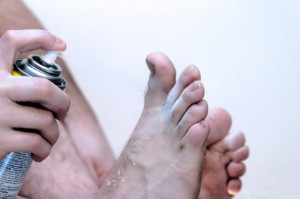Dallas (214) 340-8885
Athens (903) 677-9090
Gun Barrel City (903) 887-4341
Dallas (214) 340-8885
Athens (903) 677-9090
Gun Barrel City (903) 887-4341

Athlete's foot, a common fungal infection, thrives in warm, moist environments like locker rooms and swimming pools. Symptoms include itching, burning, and cracked, peeling skin between toes. To prevent it, keep your feet clean and dry, wear breathable footwear, and avoid walking barefoot in public areas. Treatment options range from over-the-counter antifungal creams and powders to prescription medications for persistent infections. Maintaining good foot hygiene, such as washing feet daily and drying them thoroughly, is important. If symptoms persist or worsen despite self-care measures, a podiatrist can confirm the diagnosis, recommend appropriate medications, and provide tips to prevent recurrence. Prompt treatment not only alleviates discomfort but also prevents the spread of the infection to other parts of the body or to others. If you suffer from athlete’s foot, it is suggested you make an appointment with a podiatrist for a treatment plan.
Athlete’s Foot
Athlete’s foot is often an uncomfortable condition to experience. Thankfully, podiatrists specialize in treating athlete’s foot and offer the best treatment options. If you have any questions about athlete’s foot, consult with Dr. Jonathan Kletz from Texas Foot Works. Our doctor will assess your condition and provide you with quality treatment.
What Is Athlete’s Foot?
Tinea pedis, more commonly known as athlete’s foot, is a non-serious and common fungal infection of the foot. Athlete’s foot is contagious and can be contracted by touching someone who has it or infected surfaces. The most common places contaminated by it are public showers, locker rooms, and swimming pools. Once contracted, it grows on feet that are left inside moist, dark, and warm shoes and socks.
Prevention
The most effective ways to prevent athlete’s foot include:
Symptoms
Athlete’s foot initially occurs as a rash between the toes. However, if left undiagnosed, it can spread to the sides and bottom of the feet, toenails, and if touched by hand, the hands themselves. Symptoms include:
Diagnosis and Treatment
Diagnosis is quick and easy. Skin samples will be taken and either viewed under a microscope or sent to a lab for testing. Sometimes, a podiatrist can diagnose it based on simply looking at it. Once confirmed, treatment options include oral and topical antifungal medications.
If you have any questions, please feel free to contact one of our our offices located in Dallas, Athens, and Gun Barrel City, TX . We offer the newest diagnostic and treatment technologies for all your foot care needs.
Make sure you enter all the required information, indicated by an asterisk (*). HTML code is not allowed.